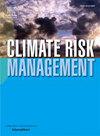Understanding coffee farmers’ poverty, food insecurity and adaptive responses to climate stress. Evidence from western Honduras
IF 5
2区 环境科学与生态学
Q1 ENVIRONMENTAL SCIENCES
引用次数: 0
Abstract
Central America faces significant vulnerability to climatic variations. In recent years, national and international organizations have promoted climate-smart agricultural (CSA) to help coffee farmers adapt to climate change. However, limited scientific evidence exists regarding the appropriateness of these strategies in mitigating vulnerability. This study aims to understand the suitability of CSA practices promoted by Honduras’ coffee sector in addressing the needs and vulnerability of coffee-farming households. We integrated quantitative and qualitative methods, to understand how coffee farmers’ poverty levels, and food insecurity status are associated with their dependence on coffee income, demographic characteristics, prevailing stressors, and the responses from farmers and value chain stakeholders. Multiple linear regression and machine learning techniques examine these relationships. Data from a survey of 348 coffee farmers in western Honduras, along with key stakeholder interviews and focus group discussions, inform our analyses. Results indicate that households’ poverty levels and food insecurity are associated with being more dependent on income from the coffee production than from other income sources. Most CSA-related efforts focus on maintaining or enhancing the coffee production, such as introducing grasses or shrub trees, but do not explicit address food security concerns among smallholders. However, around 50% of the smallholders are food insecure. Coffee households report climate hazards, pests and diseases, and low coffee prices as key problems, which are associated with crop losses, income instability, and food insecurity. Our findings suggest that broadening the scope of coffee CSA practices to include food security and income stability could better support smallholder resilience.
了解咖啡农的贫困、粮食不安全和对气候压力的适应性反应。来自洪都拉斯西部的证据
中美洲极易受到气候变化的影响。近年来,国家和国际组织都在推动气候智能型农业(CSA),以帮助咖啡农适应气候变化。然而,关于这些策略在减轻脆弱性方面是否适当的科学证据有限。本研究旨在了解洪都拉斯咖啡部门在解决咖啡农户的需求和脆弱性方面推广的CSA做法的适用性。我们将定量和定性方法结合起来,了解咖啡农的贫困水平和粮食不安全状况与他们对咖啡收入的依赖、人口特征、主要压力源以及咖啡农和价值链利益相关者的反应之间的关系。多元线性回归和机器学习技术检验了这些关系。来自洪都拉斯西部348名咖啡农的调查数据,以及主要利益相关者访谈和焦点小组讨论,为我们的分析提供了信息。结果表明,家庭的贫困程度和粮食不安全程度与对咖啡生产收入的依赖程度高于其他收入来源有关。大多数与csa相关的努力侧重于维持或提高咖啡产量,例如引进禾草或灌木树木,但没有明确解决小农的粮食安全问题。然而,大约50%的小农没有粮食保障。咖啡家庭报告说,气候灾害、病虫害和咖啡价格过低是主要问题,这些问题与作物损失、收入不稳定和粮食不安全有关。我们的研究结果表明,扩大咖啡CSA实践的范围,包括粮食安全和收入稳定,可以更好地支持小农的抵御能力。
本文章由计算机程序翻译,如有差异,请以英文原文为准。
求助全文
约1分钟内获得全文
求助全文
来源期刊

Climate Risk Management
Earth and Planetary Sciences-Atmospheric Science
CiteScore
8.20
自引率
4.50%
发文量
76
审稿时长
30 weeks
期刊介绍:
Climate Risk Management publishes original scientific contributions, state-of-the-art reviews and reports of practical experience on the use of knowledge and information regarding the consequences of climate variability and climate change in decision and policy making on climate change responses from the near- to long-term.
The concept of climate risk management refers to activities and methods that are used by individuals, organizations, and institutions to facilitate climate-resilient decision-making. Its objective is to promote sustainable development by maximizing the beneficial impacts of climate change responses and minimizing negative impacts across the full spectrum of geographies and sectors that are potentially affected by the changing climate.
 求助内容:
求助内容: 应助结果提醒方式:
应助结果提醒方式:


